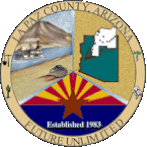| |||||||||||||||||
HOLLIE LUCAS
SUPERIOR COURT CLERK
LA PAZ COUNTY
1316 KOFA AVE., SUITE 607
PARKER, AZ 85344
(928) 669-6131
OFFICE HOURS
|
MONDAY THROUGH FRIDAY
|
8:00 A.M. TO 5:00 P.M.
|
CLOSED LEGAL HOLIDAYS
|
F.A.R.EProposed local rule changes |
Public Access to Court Cases
Notice: Some cases or documents may not appear on public access. To inquire about a particular case or document,
please call our office at : (928-669-6131) |
Para acceso a formas de la Corte en Espanol, presione aqui
Este enlace le dará acceso a la pagina de formas del Condado de Maricopa.
Simplemente, tache Maricopa County y escriba La Paz County, si la forma va
ser entregada en El Condado de La Paz
Simplemente, tache Maricopa County y escriba La Paz County, si la forma va
ser entregada en El Condado de La Paz
|
For access to criminal and civil court documents in the Superior Court visit the eAccess portal.
|
For more information about the eAccess portal please visit:
|
If you are required to pay fines, penalties, fees or other financial obligations as a result of a judgement of this court and you are unable to pay, bring this information to the attention of court staff or the judge because payments over time or other alternatives may be available. Do not ignore your responsibility to pay, as this may result in additional penalties and costs to you. For more information, contact the court or an attorney.
Si a usted se le exige pagar multas, sanciones, cuotas u otras obligaciones económicas como resultado de una sentencia en este tribunal y no puede pagarlas, avíseles o al personal del tribunal o al juez de su situación porque puede ser posible pagar a plazos o puede existir otra opción.
No haga caso omiso de su responsabilidad de pagar, el cual le podría generar nuevas sanciones y costas. Para obtener más información, póngase en contacto con el tribunal o un abogado.
Si a usted se le exige pagar multas, sanciones, cuotas u otras obligaciones económicas como resultado de una sentencia en este tribunal y no puede pagarlas, avíseles o al personal del tribunal o al juez de su situación porque puede ser posible pagar a plazos o puede existir otra opción.
No haga caso omiso de su responsabilidad de pagar, el cual le podría generar nuevas sanciones y costas. Para obtener más información, póngase en contacto con el tribunal o un abogado.
AZPOINT, the Arizona Protective Order Initiation and Notification Tool, has been designed to help you fill out a petition for an Order of Protection. Through an interview in AZPOINT, you can quickly and accurately fill out the forms that are needed to request an Order of Protection at an Arizona court. An Order of Protection is a court order that is issued to stop a person from committing domestic violence or from contacting other people protected by the order. The portal will also help you figure out whether you (the plaintiff) and the person from whom you are seeking protection (the defendant) have a qualifying relationship for an Order of Protection. Your information will be saved in AZPOINT for up to 90 days. At any time during this 90-day period, you may take the next step of filing your petition at an Arizona court. Until you file your petition at a court, you will be able to return to AZPOINT to update your information if necessary. You are encouraged to speak to a victim advocate before you file your petition. An advocate can help you make a safety plan and give you more information about how an Order of Protection works and how it will be served on the defendant. For more information, click here to go to AZPOINT.
The Arizona Supreme Court’s Committee on Mental Health and the Justice System, in partnership with the Arizona Foundation for Legal Services, have established a new website called AZCourtCare (azcourtcare.org) to share information about the involuntary treatment process in Arizona, otherwise called “civil commitment.” This legal process takes place in the superior court and may take place if a person experiencing a mental disorder is considered a danger to themselves or others and is unwilling or unable to accept voluntary treatment.
The Arizona Supreme Court’s Committee on Mental Health and the Justice System, in partnership with the Arizona Foundation for Legal Services, have established a new website called AZCourtCare (azcourtcare.org) to share information about the involuntary treatment process in Arizona, otherwise called “civil commitment.” This legal process takes place in the superior court and may take place if a person experiencing a mental disorder is considered a danger to themselves or others and is unwilling or unable to accept voluntary treatment.















